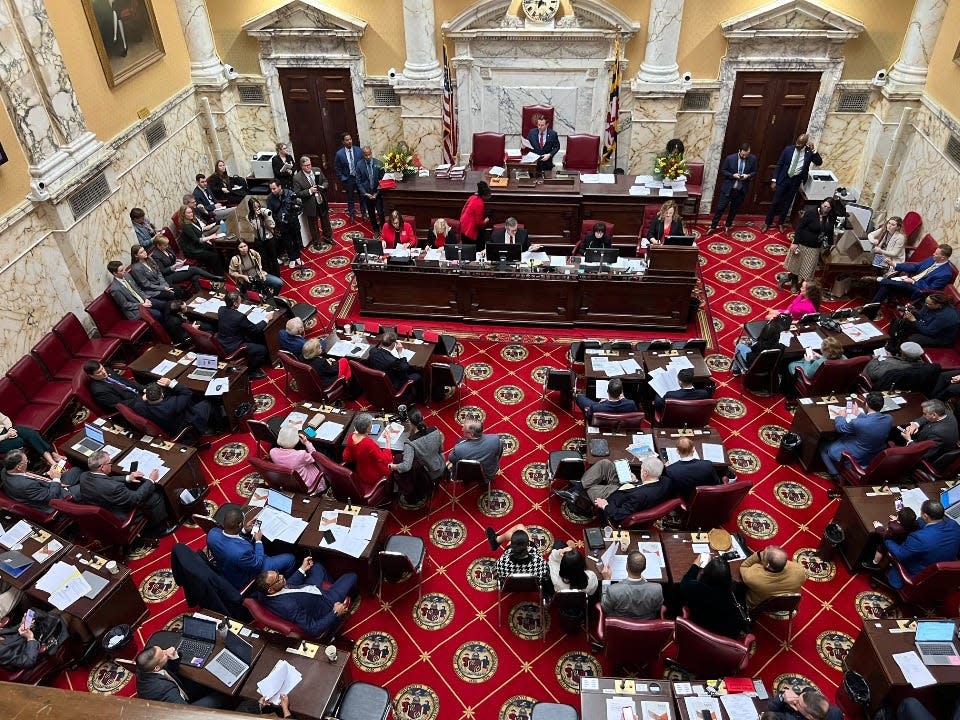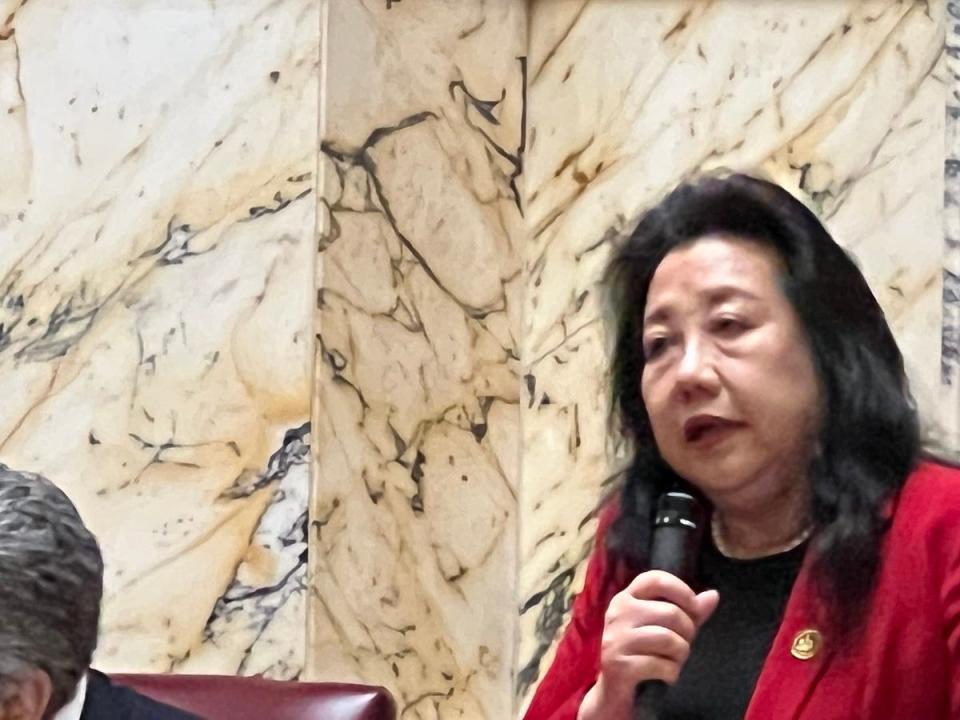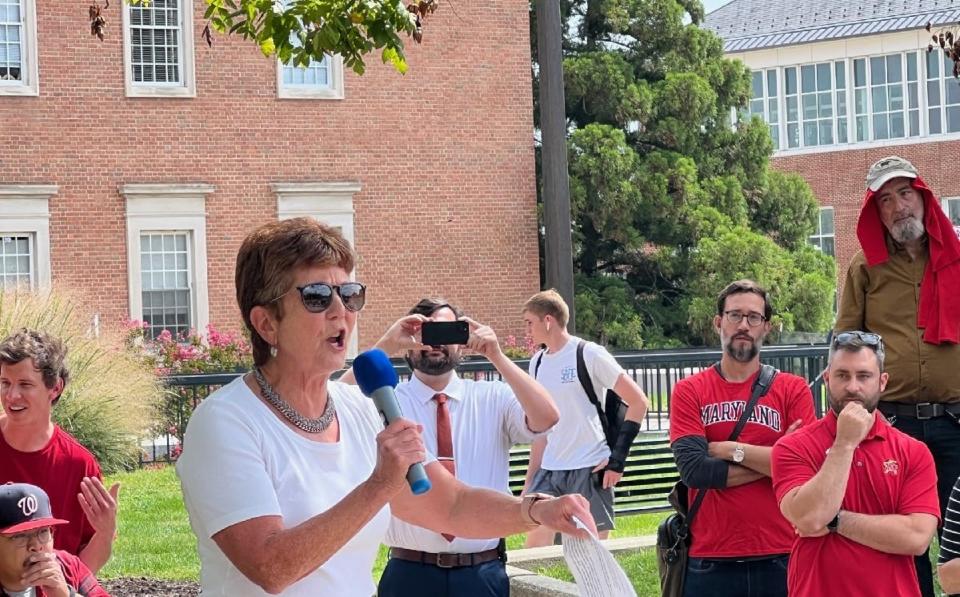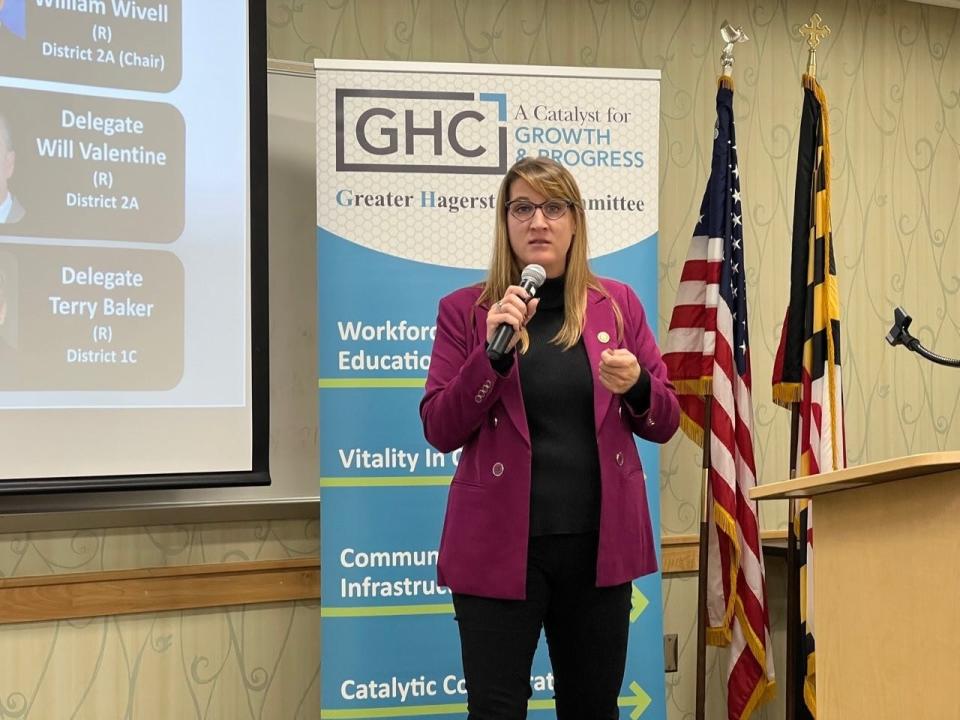'Voters should pick': Maryland lawmakers consider how to fill General Assembly vacancies
- Oops!Something went wrong.Please try again later.
It is a presidential election year in the United States, and in Maryland, one state Senate committee considered eight election-related bills on Tuesday that could shape parts of the process for voters across the state.
The vice-chair of the Senate Education, Energy, and the Environment Committee introduced four of the bills herself, including one to adjust the process for filling vacancies in the Maryland General Assembly and another to alter procedures in the case of a recount. Regarding the vacancies, vice-chair Sen. Cheryl Kagan, D-Montgomery, told fellow members her view.
“There is growing consensus that we have a problem with more and more legislators being selected by party leaders rather than elected by the voters,” said Kagan, during testimony. About a quarter of Maryland state legislators were initially appointed, according to a release last year from two Maryland organizations self-described as “pro-democracy.” In Kagan’s own Montgomery County, an analysis by a local media outlet, MoCo360, found 40 percent of that jurisdiction’s state legislators were initially appointed, including five of the 35 members in the past 12 months.

More: Maryland elections: Add these important dates to your 2024 calendar
Kagan, first elected to the Maryland House of Delegates in 1994, told the committee one of the things she learned to ask early on in her career as a legislator before introducing a bill was: “Is there a problem?” On Tuesday she answered her own question.
“There is a problem,” she said, “Democracy is not being served by more and more legislators being nominated by our political party committees and then appointed by the governor.”
Analysis: 25 to 40% of Md. lawmakers were appointed
In a hallway interview in the Senate Office Building after testifying at the hearing, Liza Smith recalled the last conversation she had with her dad, once a farmer or sharecropper in North Carolina, before his death two years ago—it was about elections and voting.
Smith recounted telling him that she was considering a run for a seat on the Montgomery County Democratic Central Committee, an organization charged with nominating to the governor someone for a legislative seat in the event of a vacancy.
“When I told him what we had to go through in Maryland, he said, ‘Everyone should have the right to vote,’” Smith said. At the time, she said, her dad lived in Virginia, a state with special elections in the event of a vacancy (the direction in which a pair of bills may take Maryland, if passed).

“He understood,” she said, “the whole Jim Crow situation, he wasn’t allowed to vote,” referring to the discriminatory laws from the first part of the 20th century that, in part, prevented Black people from voting, particularly in the Southern states. “But he believed in voting,” said Smith, of her dad.
Referring to the 13 central committee votes necessary in Montgomery County to nominate someone for a gubernatorial appointment to the General Assembly, Smith, elected to the post on the central committee in 2022, said: “It’s stealing a vote and that’s what my dad was against.” The jurisdiction has over a million people and is represented by 35 total legislators in Annapolis.
Smith said she learned just three years ago that some of the people were appointed by the party central committees. “I didn’t know the people we’re appointed,” she said, “I had no clue.” After her election, she started an online petition that has since garnered over 200 signatures for reform.
During the hearing, Smith indicated: “I am testifying in my personal capacity as a Maryland resident,” adding “my opinions do not reflect those of any group to which I may belong.”
More: Elected officials from across Maryland flood Annapolis as General Assembly session begins
Bill aims to increase transparency
State Sen. Clarence Lam, D-Anne Arundel/Howard, introduced a bill during the hearing Tuesday not to require special elections, but to increase transparency in the process of filling vacancies.
Lam, a congressional aspirant currently in the field to replace U.S. Rep John Sarbanes, D-3rd, who is not seeking reelection, broke down the two-step process that the state has now.
First, he said, the central committee representing the party and district of the former member makes a recommendation and second, the governor appoints the individual. That was the process that played out when Democratic Gov. Wes Moore appointed state Sen. Ariana Kelly, D-Montgomery, after picking Susan Lee to be his secretary of state last year. Kagan said the same process played out with Republican officials in the administration of Gov. Larry Hogan, R-Md. Lam indicated his legislation is not a commentary on those appointed, but rather about gaining constituents’ confidence.

“This bill and my push for special elections,” he told the committee, “is not related to any specific appointment, but rather in an effort to ensure that our constituents be confident in the transparency of filling General Assembly vacancies in Maryland.”
Under his proposed legislation, SB140, central committees will be required to publicly post the solicitation for seven days, publicly post applications for the vacancy, as well as publicly interview each of the applicants and hold a transparent vote. The legislation also stipulates that a committee member cannot vote for themselves.
‘Voters should pick their representatives’
For Kagan, the Montgomery County senator representing Gaithersburg and Rockville, a reform bill that she introduced went further in changing the current process with central committees.
“I believe that whenever possible the voters should pick their representatives,” she said.
Her legislation, SB29, allows for a vote by mail election to fill a legislative vacancy in the first three years of a four-year term. She received questions from the committee about cost (an estimated $150,000 per election), campaigning during and the speed of the process (potentially holding up a district from having representation during session), and the bill’s effectiveness if there are vacancies created by a special election.
Resolution would require an amendment
The senator highlighted a second bill, HB412, under consideration, sponsored by Del. Linda Foley, D-Montgomery, where the process largely stays the same, but in much of the first two years of a four-year term an appointed legislator would be then on a presidential election ballot.
That legislation, like Kagan’s bill, would require an amendment to the state’s constitution, and if passed into law, it would go before the state’s voters for approval on the November 2024 ballot.

Another Kagan bill, SB16 on campaign finance, stipulates acceptable uses of funds for political exploratory committees and was unanimously approved by the full state Senate last year. It did not gain House approval and was reintroduced before the Senate committee again on Tuesday.
That was the case too for legislation adjusting the procedures for a recount. Email correspondence with elections administrators in Worcester and Calvert counties indicated recounts have not been present in their jurisdictions in recent years. However, other counties have had recounts.
“This is not a hypothetical,” said Kagan, introducing the bill, SB115, “We’ve had close elections recently.” She pointed to elections for her county’s executive and a “super-duper close” election in Frederick County.
That “super-duper close” election for a Frederick County Council seat in 2022 came down to one vote at one point in the process.
More: Frederick County's election was recertified after the ballots were recounted and rescanned
Del. Brooke Grossman, D-Washington, who is co-sponsoring companion legislation in the House of Delegates, explained the bill in a Jan 29 phone interview.
“It’s not a super flashy piece of legislation,” she said, “it’s really more about process.”
The bill defines the types of recounts that can be requested (i.e.-a rescan, a rescan with alternative equipment, a manual recount and any others approved by State Board). It also requires that printed ballots, when recreated for scanning purposes, are kept with the duplicates in the event of a recount.

“Two judges, one from each party, recreate that document for accuracy and fairness,” said Grossman, indicating that all three documents would be kept together in the event of a recount. The intent, according to Grossman, was to ensure there was “uniformity across local boards on how those documents were housed.”
Last year, the bill “didn’t bubble to the top,” Grossman said. “We wanted to reintroduce it especially because we’re in an election year.”
Several pieces of legislation, including the House versions of the recount and vacancy bills, have a hearing in the House Ways and Means Committee next week, February 6, 2024 at 1 p.m.
Dwight A. Weingarten is an investigative reporter, covering the Maryland State House and state issues. He can be reached at dweingarten@gannett.com or on Twitter at @DwightWeingart2.
This article originally appeared on Salisbury Daily Times: Many Maryland legislators appointed to office, not elected

